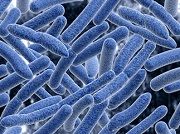Article
Gastric Troubles Traced to Pathogenesis in the Gut
Author(s):
In Europe and the United States, more than 3 million people suffer from either Crohn's disease or ulcerative colitis, and while they are becoming more common diagnoses, the root causes and triggers are not completely clear to researchers.

In Europe and the United States, more than 3 million people suffer from either Crohn’s disease or ulcerative colitis, and while they are becoming more common diagnoses, the root causes and triggers are not completely clear to researchers.
A team from Germany’s Technische Universitat Munchen (TUM) have reported taking a big step in that direction by identifying a process in the pathogenesis of Inflammatory bowel disease (IBD). According to the study, the inflammation is caused by an overreaction to bacteria in the gut by the immune system.
“This overreaction can come about if, for example, the anti-stress mechanism in the cells of the intestinal mucosa does not function correctly," said Dirk Haller, who serves as TUM’s Chair of Nutrition and Immunology.
Haller said the unfolded protein response (UPR) is an important part of the process that can cause a great amount of discomfort for patients.
“The UPR is kind of a cell repair mechanism that kicks in when proteins are not properly folded when they are produced — a major cause of cell stress," he noted.
When this happens, it can cause inflammation and cell death which can damage the intestinal mucosa, Haller said.
Much of Haller’s work focused on the C/EBP homologous protein (CHOP), which has been shown to be involved in activating UPR, as well as in the inflammatory process. Using a mouse model, the team looked at the role of the protein in the both process and chronic bowel inflammation. They also performed a DNA modification to allow the intestinal epithelial of the mouse subjects to make more protein.
The results of the study showed that, with more of the CHOP protein, the mice were more susceptible to the inflammation and it was slower to end. The researchers also reported the damage caused by the inflammation took longer to regenerate as part of the process.
“But contrary to what was previously assumed, the higher CHOP concentration is not what actually causes the epithelial cells to die,” Haller noted. “Rather, the CHOP proteins inhibit cell division, thus slowing the regeneration of the mucosa following injury.”
In the report, Haller said injuries can be caused by an infection and are an early marker of a potential chronic inflammation. His research also showed that a working UPR signaling cascade is important in having a healthy intestinal mucosa.





